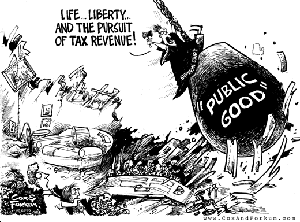Yes, according to what a well-known mainstream newspaper would want us to believe, but no if we refer to the more sound thinking of the Austrian School of Economics. In a recent article published in the Financial Times, senior editorialist Martin Wolf tries to convince the reader that there is a growing need for so-called "global public goods", starting from the insight that financial and economic instability have been a “public bad” in recent years.
According to him, the provision of public goods is becoming more and more difficult as they acquire a global nature, even though they are playing a major role in people’s lives as “building blocks of civilization”. Moreover, globalization allegedly expands the range of goods that fall into this category and makes traditional states less and less fit to provide public goods at a global level.
I consider it worthwhile combating the main thesis of the article for two main reasons. First, the theory of “public goods” is very shaky and has been clearly refuted on several grounds. Therefore, expanding it from national to a global level would only mean to “persist in error” and furthermore provide a false argument for the expansion of national states into one global Leviathan.
Second, although Wolf’s article is primarily about public goods, its staring point represents a fallacy increasingly popular among the mainstream economists. Namely, the instability of the market economy in recent times is supposedly the result of a market failure, when it is in fact a direct consequence of the fraudulent and flawed functioning of the modern fractional-reserve banking sector.
Criticisms of the public goods theory
Wolf’s article starts by giving a brief explanation of Samuelson’s classic public goods theory. Public goods are supposed to be (1) “non-excludable” and (2) “non-rivalrous”. This means that (1) non-payers cannot be prevented from enjoying their benefits (thus becoming “free-riders”) and (2) they can be consumed by an additional consumer at no extra cost.
The government production of public goods is apparently the solution to a “market failure”, i.e. the impossibility to make all consumers pay for the perceived external benefits they enjoy, which leads to the under-supply of certain goods on the free-market.
Wolf goes on to say that “the history of civilization is a history of public goods” and the mankind cannot do without global public goods as it becomes more and more interconnected at a global level. Such goods would range from the supply of security to the management of climate and may include economic stability and even health or education.
With “overstretched and at odds” states “on which humanity depends to provide these goods” what remains to be done? Wolf stops short of advocating the creation of a single world state but asks for “extraordinary creativity” to find some sort of leadership in a multipolar world.
The intertwined theories of “public goods” and “externalities” have been already refuted on several grounds, some of which are presented below.
As Hoppe[1] remarks, the entire distinction between the two categories of public and private goods is illusory as different authors classify the same good or service differently. This is not surprising given that all of the so-called public goods that are now provided by states can be and were successfully supplied by the markets at some point in history.
Rothbard[2] pointed out that not only postal services, education, health charity, roads, railways and canals have actually been provided by private entrepreneurs, but also more controversial private services such as defense and competitive courts existed for example in medieval Ireland.
The main characteristic of common-law courts was the competitive and private appointment of judges. Coase[3] has shown for example that even the textbook example of the lighthouse as a public good does not hold water, as the British system of lighthouses has been owned and operated privately from the 17th to the early 19th century.
Because the free-market can supply all of the supposedly “public goods” then the second line of defense for government intervention is that the market would supply only “too little” of them. But, the so-called theory of “externalities” is equally flawed. Block[4] argues convincingly that there is no such good which does not have spill-over benefits or costs to a third party.
That being the case, by reduction ad absurdum, the government should be allowed to regulate or take control of every aspect of our economic lives in order to address the so-called “market failures”. “Social return” could be in principle higher than private return for all goods, leading to the absurd conclusion that the state ought to subsidize all intermediate goods and services.
Block asks rhetorically why roads should be treated differently than steel. In particular as there is no objective way of calculating the overall “social return” of a particular good, i.e. by a market test, the government cannot rationally plan its intervention. Thus from the alleged under-production on the unhampered market, one can easily fall into the other extreme of over-supplying a “public good”.
One should also ask whether the government could be an efficient provider of the “public” good under-supplied by the markets. Many would give a negative answer due to the dismal economic performance of the public sector, which is further weakened by corruption practices that may erase any allocation gains.
Moreover, the provision of public goods is paid by compulsory taxation and comes at the cost of forgone consumption of other goods. Rothbard emphasized that only individual preference translated into market exchange can truly show the real value of a good. Without voluntary exchange and only using some mathematical guesswork one cannot argue that the uses from which money is withdrawn to finance the public goods are less valuable than the public goods themselves. Only the market test can say which goods are more needed.
Government intervention, therefore, will always move away from such an optimum. Hoppe contends that there is not market failure, as this is just the nature of markets. They are not perfect, but consumers decide for themselves what they need. Yet, this imperfection of the free-market can be defended morally and economically, whereas the hypothetical perfection of markets transformed through government aggression is hard to defend.
Finally, one may argue that externalities can be internalized by excluding non-payers and thus private property is allowed to function. With the advancement of new technologies it is much easier to make interested users pay, as the examples of pay TV, software, toll roads, etc show.
As a consequence, free-riding, one of the most important issues raised by the advocates of the public goods theory is invalidated. How can one explain otherwise the fact that Bill Gates became the most successful and rich businessman on the planet by providing a good that would match perfectly the public good criteria? Of course, one cannot call free-riders those for whom the benefits are unsolicited. After all, aren’t we all free-riding on the capital accumulated by our ancestors or on the masterful creations of Beethoven or Rachmaninoff?
Centralization as Hobbesian drive for collective security
After a careful look at the above arguments it becomes clear that the intellectual merits of the public goods theory are minimal. It appears more as if the theory served as a pretext for an expansion of the state in several economic and social areas that would have taken place anyway.
It is just a more intellectually respectable argument in favor of the institutionalized aggression against the free-market. Hoppe[5] has brought strong arguments against the Hobbesian myth of "collective security", which contends that in order to ensure peace in the society, defense can only be supplied by a third party monopolist, because of the bad nature of the mankind. This monopolist would be the king, state or dictator having the power to extract taxes in order to provide this collective service.
Actually, by allowing such a monopoly on defense, the issue of permanent interpersonal warfare may not be solved at all. As a matter of fact, individuals could become subject to a formidable concentration of power in the hands of the monopolist which may not only curtail all their freedoms, but also drive them into much more destructive conflicts and wars until the power monopoly becomes complete at a global scale.
Hobbes’ argument taken to its very end would imply that the monopolists will fight each other for supreme power until a single world government would eventually emerge. And why should one believe that the monopolist would not have bad intentions when the basis of the Hobbesian theory is that "homo homini lupus est"?
By looking at the modern history with a critical eye, Hoppe found enough evidence that this process is underway. The number of states has drastically declined[6] while the steps towards centralization, political unification and the creation of dominant supranational institutions have multiplied[7].
Concomitantly the internal expansion of states advanced, curtailing more and more the freedom of their subjects. Nowadays, in the so-called "Western free-world", governments expropriate and control between 40 and 50% of the incomes of private producers (without counting for the wealth confiscated via inflation) and regulate almost every aspect of the economic and social life of their citizens[8].
It was all done in the name of providing "collective goods" and protecting the people against countless bogus public enemies and dangers. At the same time, conflicts have turned from old-fashioned and small-sized territorial disputes fought by mercenary armies into total and ideological wars fought by entire nations, based on compulsory conscription and resulting in dozens of millions of casualties.
There is no doubt that as this trend moves forward a more compelling intellectual justification for global political unification will be needed and an emerging theory of "global public goods" as exemplified by Wolf’s contribution will come in very handy.
Public banking and increased financial instability
Hoppe also noticed that while states supplied more and more public goods, financial stability grew weaker. It is not surprising if one considers the role that inflation can play in facilitating the stealth expansion of the state without getting the taxpayer outraged by the confiscatory cost of public goods.
This brings us to the main starting point of the discussion: economic and financial stability as a "public good". However, Wolf sees things differently:
“Economists have tended to assume that the market economy is inherently stable. If so, stability is supplied automatically. Unfortunately, this is not so. A free-market economy can expand credit without limit, at zero cost. Since money supply is simply the liability counterpart of private credit decisions, instability is baked in the economic cake. For this reason, economic stability is a public good we find quite hard to supply. The consequences of the repeated failure to do so can also be dire. Even the late Milton Friedman believed that government intervention, via the central bank, was needed to prevent long chains of banking collapses.”
In this case, Wolf starts from a correct assumption – economic and financial instability in modern times are the direct consequence of unlimited credit expansion at "zero cost". At first sight, this is consistent with the monetary theory of the business cycle[9] developed by the Austrian School, primarily by Mises and with later contributions by Rothbard, Huelsmann and Garrison.
However, Wolf is plainly wrong when he attributes the unlimited expansion of credit to the free-market. The functioning of the modern fractional-reserve banking system which is able to multiply credit in excess of the savings deposited with it does not observe the property rights of depositors. This would not be allowed under a truly free-market system which obviously cannot function properly if the rules protecting private property are encroached upon. It also goes without saying that this fraudulent system could not have been created without the tacit acquiescence of the rulers.
Initially, banks started by issuing banknotes in excess of the gold deposited for safekeeping, realizing that they could earn bigger, but illicit profits. De Soto[10] showed that under a free and competitive banking system this practice was limited by the risk of losing gold reserves in the inter-bank clearing process and by the threat of depositor runs on the fraudulent banks. He documented how several banks, among which the Florentine banks in the fourteenth century, the Medici Bank and later the Amsterdam Bank, had been quite successful when they maintained a 100% reserve ratio, but went bankrupt once they violated this rule.
Although the rulers should have intervened to protect private property rights and punish fractional-reserve, they turned a blind eye instead, as they were among the main beneficiaries of the fraudulent credit expansion. They even set up public banks in order to profit directly from this illicit activity. Later, banks found it more convenient to collude in inflating their gold deposits at a similar pace (thus overcoming the inter-bank clearing problem) and pooled their gold reserves in central banks in order to reduce the risk of bank runs.
Moreover, governments gave central banks a monopoly on the issue of banknotes and empowered them to act as lender of last resort in order to remove the risk of a general bank run. Finally, the link between banknotes and gold was severed and the modern banking system which operates by multiplying the fiat money issued by central banks “out of thin air” was ready to function. Indeed, this system ensures unlimited expansion of credit at "zero cost" and has a strong inflationary bias.
It is not difficult to see why the modern “unholy alliance” between governments and the banking sector came into being. On one hand, the fractional-reserve banking sector is inherently bankrupt being vulnerable to bank runs and needs the central bank to provide it with liquidity as lender of last resort. On the other hand, governments are the main beneficiaries of the inflation resulting from the bank credit multiplication.
The special regulatory framework under which banks operate nowadays, based on capital and liquidity limits, is not meant to reduce their expansionary bias[11], but rather to conceal the fact that the banking sector operates completely outside of the private property order of a free-market. So, nothing is further from the truth than the idea that excessive credit expansion is a product of free-markets or central banks were set up to correct it.
Public goods only for the benefit of certain elites
I believe that we have gathered sufficient arguments by now to strongly doubt the contention that the world seen as a community of free individuals would crave for more public goods. The post-war large-scale expansion of collective goods and government intervention in the Western World has resulted in over-regulated and over-sized welfare states, chronic inflation, relative impoverishment and recurrent economic and financial crises.
But, even without being the "building blocks of civilization", as claimed by Wolf, public goods may still be coveted by some. For certain political and financial elites the public goods hoax may remain the main vehicle by which to disguise their real selfish intentions.
The Hobbesian transition to a global monopoly of power is probably the big stake in this act of deception. This can be recognized by the progressive move towards global political integration and a steady continuation of wars and rearming even after the end of the cold war[12].
One cannot rule out that if this trend continues a world state will emerge. It will not necessarily be built as a single government, but could be made up of several puppet political regimes, discretely run according to the same set of "democratic" rules by the elites that control the global finances and the military-industrial complex.
In this case, the world will indeed become hungry for its most precious good – individual freedom, which is likely to become quite scarce in the absence of competition between political units and regulatory regimes. And who knows, maybe only then, Hoppe’s call for secession from the regimes of "constitutionally limited government", for private production of defense and for social life based on the cultivation of natural elites will seem less exotic than it appears today.
[1] See Hans-Hermann Hoppe, "Fallacies of the Public Goods Theory and the Production of Security", The Journal of Libertarian Studies, Vol. IX, No. 1 (Winter 1989).
[2] See Murray N. Rothbard, "The Myth of Neutral taxation", The Cato Journal, Fall, 1981.
[3] See Ronald Coase, "The Lighthouse in Economics", Journal of Law and Economics 17 (2), 1974.
[4] See Walter Block, "Public Goods and Externalities: The Case of Roads", The Journal of Libertarian Studies, Vol. VII, No. 1 (Spring 1983).
[5] See Hans-Hermann Hoppe, "Democracy – the God that failed", Transaction Publishers, New Brunswick, New Jersey, 2001.
[6] "For instance, during the second half of the seventeenth century Germany consisted of some 234 countries, 51 free cities, and 1,500 independent knightly manors. By the early nineteenth century, the total number of the three had fallen to below 50, and by 1871 unification had been achieved. The scenario in Italy was similar.", idem, page 108.
[7] The United States have attained hegemonic status over Western and Eastern Europe and the Pacific countries and it is attempting a similar breakthrough in the Middle East and other remaining Arabic countries. Economic and political integration in the European Union is almost completed. The U.S. Federal Reserve System and a few other major central banks – the ECB, Bank of England and Bank of Japan have full control over the Western banking system and via the International Monetary Fund and the World Bank over all the emerging economies.
[8] In particular, citizens were gradually stripped of the right to exclusion which private property implies.
[9] The theory explains how artificially depressed interest rates below the level reflecting time preference and the corresponding amount of real savings in the economy would signal businesses to invest more in long-term and capital-intensive projects. If entrepreneurs fail to recognize the inconsistency between the price and availability of savings, a misallocation of capital takes place resulting in a boom and bust process.
[10] See Jesus Huerta de Soto, "Money, Bank Credit, and Economic Cycles", Ludwig von Mises Institute, Auburn, Alabama, 2009.
[11] The only effective tool to limit undue credit expansion is a 100% reserve requirement on demand deposits and allowing banks to go bankrupt if they fail to manage properly their asset-liability maturity mismatch. The other so-called bank prudential norms can be easily fulfilled while expanding credit excessively by changing the destination of credit and transforming bank assets, accessing central bank liquidity or using central bank liquidity to upgrade capital buffers.
[12] The United States defense spending has almost doubled in real terms since the 2001 attacks on the World Trade Center and there is huge opposition against the meager defense cuts proposed by Obama despite the gargantuan fiscal deficit of about 10% of GDP. At the same time, Putin has announced military spending to the tune of EUR 600 billion over the next decade in response to the threat of the NATO anti-missile defense system.





